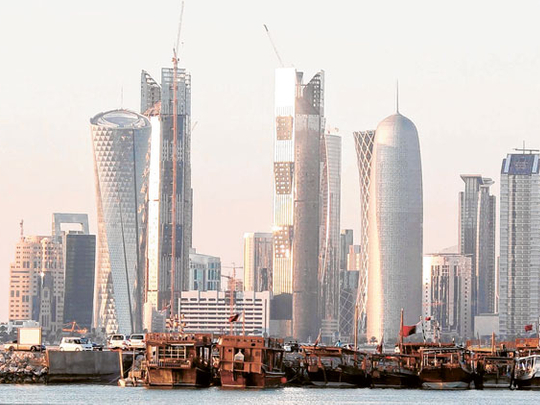
Dubai: It's not surprising that the majority of this year's dividend stock picks of fund managers and market analysts are from two of the better performing markets of the region: Qatar and Saudi Arabia. Companies here have been witnessing double-digit growth in their revenue, in part as a result of increased government spending. The Qatar stock index ended 2011 with a positive return of 1.5 per cent and Saudi Arabia was the second best performing market, closing down 3.1 per cent.
The dividend yield — the ratio of payouts to share price — has been fairly strong in the region, especially when compared to their peers in emerging and developed countries over the last two years. In 2011, among the larger regional markets, Kuwait had a yield of 5.6 per cent, followed by Dubai (4 per cent), Qatar (3.9 per cent) and Saudi Arabia (3.8 per cent). The smaller markets of Oman and Bahrain boasted yields of between 5 per cent and 6 per cent.
In contrast, the S&P500 Index yield stood at 2 per cent, Dow Jones Industrial Average Index at 2.5 per cent and MSCI Emerging Markets Index at 3 per cent last year.
Varied results
In the Gulf countries, the telecommunications sector has always been among the highest dividend payers, yielding an average of 5 per cent but reaching 7 per cent in some cases. Other sectors have had more varied results. While financial stocks' yields have generally been low, Qatari banks have achieved yields in the range of 7 per cent to 9 per cent. There are also individual consumer and industrial stocks in the GCC which are dividend rich.
Gulf dividend yields are expected to marginally increase or at least be at the same levels as last year, according to some fund managers. Based on their estimates, investment bank SICO of Bahrain, expects the overall profitability of the listed companies to increase as much as 20 per cent this year, resulting in an increase in free cash flow. "While on a normalised basis we expect the dividend yields to go up, but the increase will not be that noticeable on overall basis due to companies such as Zain, which paid extraordinary dividends last year," says Shakeel Sarwar, head of asset management at the investment bank.
Raghu Mandagolathur, senior vice president-research, Kuwait Financial Centre ("Markaz"), agrees. "There may be some softening in dividends in 2012 as many of the payouts were in relation to divestments, such as in the case of Zain Group, and were not necessarily tied to core operations," he says. "Moreover, dividends for petrochemical firms may be slightly weaker given an expected softening in earnings due to lower commodity prices and weaker global demand." Both agree that dividends in the region would continue to outperform emerging and developed markets. The reason behind that is "the operational earnings of most firms, especially larger ones, depend mainly on local demand and conditions, which are set to either remain flat or improve slightly in 2012; consequently, companies should be able to maintain their dividend levels," says Mandagolathur.
Slight softening
"This is barring certain firms like Sabic and Industries Qatar which may see a slight softening of dividends on lower earnings in the coming year due to weaker demand in key international markets like China," he adds.
Though Gulf yields are going to hold up their lead, but to see a material shift in dividend yields, Sarwar says, there has to be a substantial movement in equities prices, which is unlikely to happen in 2012.












